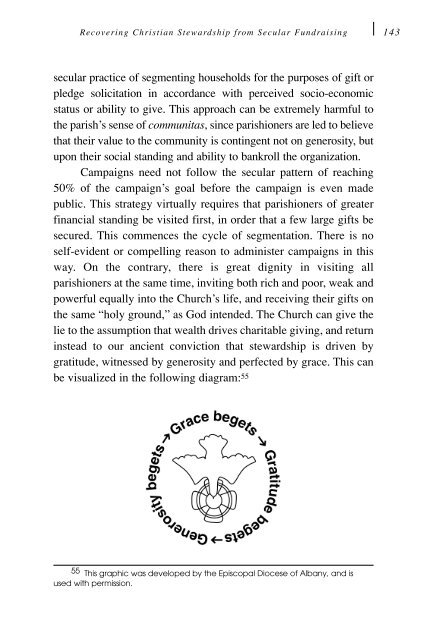Passionate Steward - 10th Anniversary Edition
10th Anniversary Edition of The Passionate Steward - Recovering Christian Stewardship from Secular Fundraising (St. Brigid Press - 2002).
10th Anniversary Edition of The Passionate Steward - Recovering Christian Stewardship from Secular Fundraising (St. Brigid Press - 2002).
Create successful ePaper yourself
Turn your PDF publications into a flip-book with our unique Google optimized e-Paper software.
Recovering Christian <strong>Steward</strong>ship from Secular Fundraising 143<br />
secular practice of segmenting households for the purposes of gift or<br />
pledge solicitation in accordance with perceived socio-economic<br />
status or ability to give. This approach can be extremely harmful to<br />
the parish’s sense of communitas, since parishioners are led to believe<br />
that their value to the community is contingent not on generosity, but<br />
upon their social standing and ability to bankroll the organization.<br />
Campaigns need not follow the secular pattern of reaching<br />
50% of the campaign’s goal before the campaign is even made<br />
public. This strategy virtually requires that parishioners of greater<br />
financial standing be visited first, in order that a few large gifts be<br />
secured. This commences the cycle of segmentation. There is no<br />
self-evident or compelling reason to administer campaigns in this<br />
way. On the contrary, there is great dignity in visiting all<br />
parishioners at the same time, inviting both rich and poor, weak and<br />
powerful equally into the Church’s life, and receiving their gifts on<br />
the same “holy ground,” as God intended. The Church can give the<br />
lie to the assumption that wealth drives charitable giving, and return<br />
instead to our ancient conviction that stewardship is driven by<br />
gratitude, witnessed by generosity and perfected by grace. This can<br />
be visualized in the following diagram: 55<br />
55 This graphic was developed by the Episcopal Diocese of Albany, and is<br />
used with permission.




